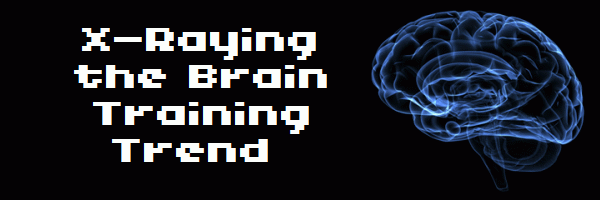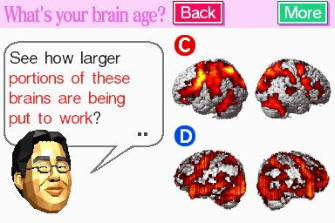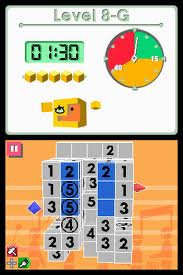
Brain games were all the rage back in 2006, but what happened to them? Despite the great reviews and large audience appeal, players stopped caring about Brain Age and Brain Age 2 roughly a month after they were each released. Repetitive gaming is only fun for so long. What newer thinking games are worth your time and money, and, more importantly, will they actually make you smarter?
Since the beginning of time, mankind has found ways to stretch their brains. Some strive to become smarter, while others thrive on being stupid. History lessons aside, the video gaming industry has found a way to capitalize on this idea, and has fairly successfully encapsulated the trend that is “brain gaming” – gaming that totally makes you “smarter.”
 The DS and Wii were the two homes of Brain Age titles, Big Brain Academy, and several third-party games. The Brain Age titles strictly set out to improve the user’s so-called “Brain Age” by presenting them with an array of puzzles ranging from math to memory to quick evaluation and organization-based tasks. When the player initially creates a profile, they are given an explanation on brain activity – “brain scans” taken from test subjects who were watching TV and comparing them against subjects who were doing work on puzzles involving math or motor skills. Though the scans seem impressive, there is often a question regarding how much these titles truly improve the brain activity of the users. A study done by Time Magazine in April 2010 states that no notable improvement was had by the subjects of the study.
The DS and Wii were the two homes of Brain Age titles, Big Brain Academy, and several third-party games. The Brain Age titles strictly set out to improve the user’s so-called “Brain Age” by presenting them with an array of puzzles ranging from math to memory to quick evaluation and organization-based tasks. When the player initially creates a profile, they are given an explanation on brain activity – “brain scans” taken from test subjects who were watching TV and comparing them against subjects who were doing work on puzzles involving math or motor skills. Though the scans seem impressive, there is often a question regarding how much these titles truly improve the brain activity of the users. A study done by Time Magazine in April 2010 states that no notable improvement was had by the subjects of the study.
Time Magazine states:
“All participants were given a battery of unrelated, benchmark cognitive-assessment tests before and after the six-week study. These tests, designed to measure overall mental fitness, were adapted from reasoning and memory tests that are commonly used to gauge brain function in patients with brain injury or dementia. All three study groups showed marginal — and identical — improvement on these benchmark exams.
But the improvement had nothing to do with the interim brain-training, says study co-author Jessica Grahn of the Cognition and Brain Sciences Unit in Cambridge, Mass. Grahn says the results confirm what she and other neuroscientists have long suspected: people who practice a certain mental task — for instance, remembering a series of numbers in sequence, a popular brainteaser used by many video games — improve dramatically on that task, but the improvement does not carry over to cognitive function in general.”
So, through that logic (no pun intended), it can be assumed that these games aren’t actually as helpful as they portray themselves to be.
However, there has recently been a second batch of video game titles that debatably eclipse Brain Age and similar titles in quality – and in using that old noggin of yours. My personal favorite, the ever-increasing Professor Layton series collectively contains over 450 puzzles, including weekly free downloadable content. The games contain fairly difficult logic puzzles, but they are consistently fun, addicting, and intriguing. Most of the time, the game tries to trick the player into giving an answer which would require paying attention to hints, and looking past the problem itself. I couldn’t put these games down from the minute I started them.
 Another fun brain-teasing game is the DS title Picross, second only to its sequel, Picross 3D. Picross and Picross 3D are second cousins to the popular Sudoku puzzle, in that players are required to eliminate certain blocks from a massive chunk in order to find the hidden shape within. Players are required to use the numbers on the columns and rows of blocks in order to determine how many blocks will remain in each column or row at the end of the puzzle. Even four months later, this title still has a tenacious hold on me – to the point where Starcraft II is still firmly entrenched in my game queue. There are four difficulties in the game: Beginner, Easy, Normal, and Hard. Each of these difficulties sports more than six levels, each of which holds ten puzzles. In addition to the puzzles built into the game itself, there is also a continuous slew of downloadable user-created content, which is then approved by Picross’ developers, and made available for free download.
Another fun brain-teasing game is the DS title Picross, second only to its sequel, Picross 3D. Picross and Picross 3D are second cousins to the popular Sudoku puzzle, in that players are required to eliminate certain blocks from a massive chunk in order to find the hidden shape within. Players are required to use the numbers on the columns and rows of blocks in order to determine how many blocks will remain in each column or row at the end of the puzzle. Even four months later, this title still has a tenacious hold on me – to the point where Starcraft II is still firmly entrenched in my game queue. There are four difficulties in the game: Beginner, Easy, Normal, and Hard. Each of these difficulties sports more than six levels, each of which holds ten puzzles. In addition to the puzzles built into the game itself, there is also a continuous slew of downloadable user-created content, which is then approved by Picross’ developers, and made available for free download.
But, it looks as though Nintendo is about to lose their hold on Dr. Kawashima’s would-be brain-enhancing genre. Xbox 360 will soon see a Kinect release that asks players to return to their Brain Age days and repeat similar mindless tasks in order to “improve their brain age.” An early look into Dr. Kawashima’s Body and Brain Connection shows that instead of using the DS’ touch screen to draw solutions, Kinect users will need to move their body in order to satisfy the game’s requirements. Mini-games appear to have players sorting objects by color, solving math problems by kicking a soccer ball into the goal with the correct solution, and testing users’ multi-tasking ability. Though the franchise is trying to re-emerge, don’t call it a comeback just yet (although Kawashima has hinted that Brain Age 3 is in development too).
The soon-to-be-released XBLA game Ilomilo will force players to use their brains as well, but not quite in a learning sense. ilomilo offers a large variety of stages where players will have to reconnect best buddies ilo and milo in each level. Stages begin fairly simply, but quickly evolve into environments that will have even the most devoted puzzle gamer scratching their head. Combining traits from Echochrome, Braid, and Super Mario Galaxy, gamers will have to modify the environment in every way possible in order to reunite the two picnicking pals. While it plays like a platformer, Ilomilo becomes slightly confusing well before the first world is even finished.
Regardless of the current state of these so-called brain games, the Time magazine study shows that when any person is forced to repeat a certain task, the reflexes involved in completing those tasks do indeed become faster. Overall, though, the increased speed of the reflex does not produce an improved IQ score. While speedy reflexes improve problem-solving, critical analysis is in a whole different boat. Trends tend to show that many games that do not advertise brain strengthening, or “brainthening” as I like to call it, are still incredible amounts of fun. After all, who’s to deny any gamer their fair share of puzzles?







